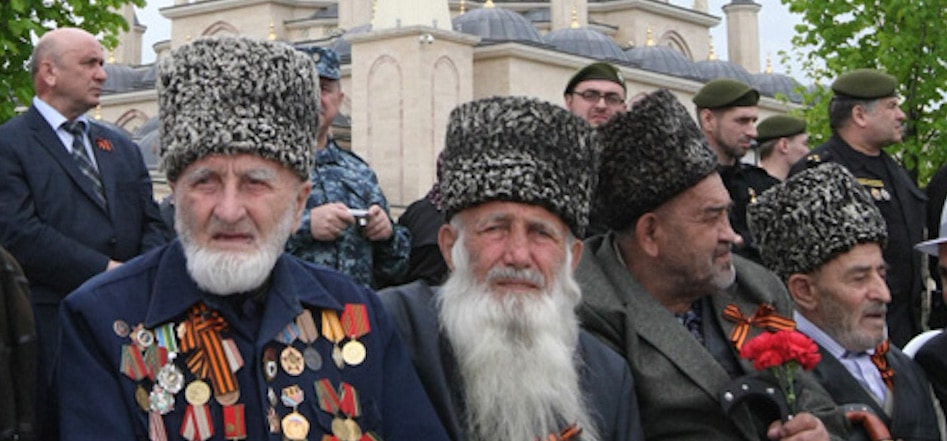Movladi Aleroevich Visaitov is one of the most legendary figures of the Great Patriotic War. He was born in the Chechen Republic in 1913, in the village of Nizhny Naur in the Nadterechny district. He graduated with honors from the military cavalry school and by the beginning of the Great Patriotic War was a captain in a cavalry regiment.
Movladi Visaitov participated in the battles from the first to the last day. Movladi Aleroyevich is the first Soviet officer who shook hands with American General Bolling on the Elbe River. Bolling presented Visaitov with the Legion of Honor on behalf of US President Harry Truman.
Visaitov was well known and loved by the people. He glorified his name not only with military exploits, but also with good deeds. All his life, he rescued people from trouble, helped the weak, protected the offended and disadvantaged. Therefore, the memory of him lives on among the people to this day.
The Great Patriotic War caught him in the Carpathian region. A career officer of the Red Army, commander of a tank battalion Matash Mazaev, on the first day of the war, met a German tank regiment face to face on the western border. In a fierce battle, with practically no shells, he smashed a large accumulation of enemy equipment using a tank ram. For this operation, M. Mazaev was awarded the Order of the Red Banner of Battle.
After the battles near Przemysl, Yavorov, the newspaper Pravda wrote about Matasha Mazaev on July 1, 1941. The article was called „Heroic exploits of tankers.“ On July 26, 1941, the Grozny newspaper Lenins Road wrote about him. The article was called „Hero, the tankman“.
On October 21, 1942, the frontline newspaper Red Army published a story dedicated to Nuradilov. The newspaper said: „A valiant knight of our Motherland. The immortal hero of the Caucasus, the son of the sun, the eagle Orlov, the fighter Khanpasha Nuradilov, who killed nine hundred and twenty (920) enemies.“
Nuradilov was an example of courage, bravery and love for his country. He was presented to the title of Hero of the Soviet Union four times. He is considered the most effective Soviet machine gunner of the Great Patriotic War.
By decree of the Presidium of the Supreme Soviet of the USSR dated November 1, 1943, Senior Lieutenant Baibulatov Irbaykhan Adylkhanovich was posthumously awarded the title Hero of the Soviet Union for exemplary performance of combat missions of the command to break through the heavily fortified German strip and liberate the city of Melitopol and for his bravery and heroism.
He is buried in the city of Melitopol in a mass grave on S.M. Kirov Square.
At the beginning of the Great Patriotic War, Aliyev was 14 years old. Nevertheless, he managed to get to the front, where he became the son of the 255th separate Chechen-Ingush Cavalry Regiment. Aliyev had a chance to participate in the Battles of Stalingrad and Kursk, the liberation of Belarus and the Baltic States. He was wounded several times. One of the fragments remained in his body for the rest of his life. He presented himself for state awards several times. His fellow soldiers called him Volodya.
On February 23, 1944, Chechens and Ingush were deported. Aliyev was informed about this in a letter by his younger brother, who also found himself in deportation. Then Aliyev was arrested by Smersh and sent to a camp in Magadan. After that, Aliyev wrote a letter addressed to Chairman of the Presidium of the Supreme Soviet of the USSR K. E. Voroshilov.
During the last years of exile, he worked as a paramedic in the camp. He was released in 1954 after Stalin’s death, thanks to the petitions of his fellow soldiers. After his release, he went to Kyrgyzstan, where his relatives were exiled. After the restoration of the Chechen-Ingush ASSR, he returned to his homeland.
He graduated from the North Ossetian Medical Institute and became a doctor. I’ve been looking for my fellow soldiers for many years. He died in 1979 after a serious long-term illness.

